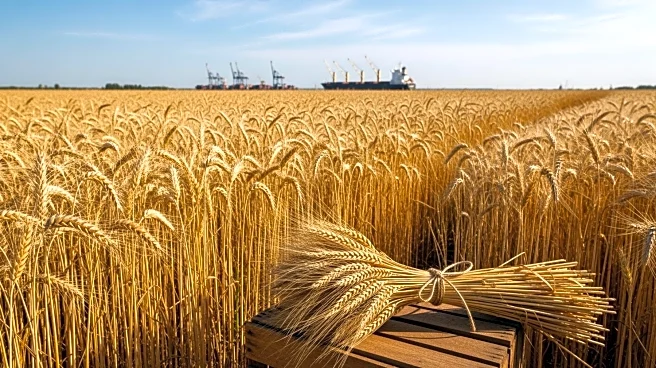What's Happening?
Russia has resumed wheat shipments to Indonesia after a pause since January due to negotiations over grain access. The state agriculture watchdog confirmed the resumption, with Indonesia's Quarantine Agency
extending safety certificates for Russian grains. Russia plans to supply 52,000 metric tons of wheat in October, with expectations to increase exports to 1.3 million tons in 2024. The move is part of Russia's strategy to diversify wheat exports to Asia, facing competition from the United States, which is expanding its market presence through trade deals. Russia's wheat exports have declined due to global oversupply, low prices, and local challenges such as bad weather and high costs.
Why It's Important?
The resumption of wheat exports to Indonesia is crucial for Russia as it seeks to strengthen its position in the Asian market amid global competition. Indonesia, a major wheat importer, offers significant opportunities for Russian exporters, especially with the potential for a free trade agreement that could eliminate import duties. The development is vital for Russia's agricultural sector, which has faced profitability challenges due to economic factors. The competition with the United States highlights the geopolitical dimensions of agricultural trade, where market access and trade agreements play a pivotal role in shaping international relations and economic strategies.
What's Next?
Russian officials and businessmen are scheduled to visit Indonesia for agriculture trade talks on October 17, aiming to solidify trade relations and negotiate favorable terms. The potential free trade agreement between the Russia-led Eurasian Economic Union and Indonesia could further enhance trade by reducing tariffs. The outcome of these negotiations will be critical in determining Russia's future market share in Indonesia and its ability to compete with U.S. wheat exports. The situation may also influence broader trade dynamics in Asia, as countries navigate economic partnerships amid shifting geopolitical landscapes.
Beyond the Headlines
The resumption of wheat exports to Indonesia reflects broader trends in global agricultural trade, where countries are increasingly seeking to diversify markets and reduce dependency on traditional partners. The situation underscores the importance of trade agreements in facilitating market access and the role of government policies in shaping export strategies. It also highlights the challenges faced by exporters in adapting to changing economic conditions, such as currency fluctuations and input costs. The case may prompt discussions on sustainable agricultural practices and the need for resilience in global food supply chains.










